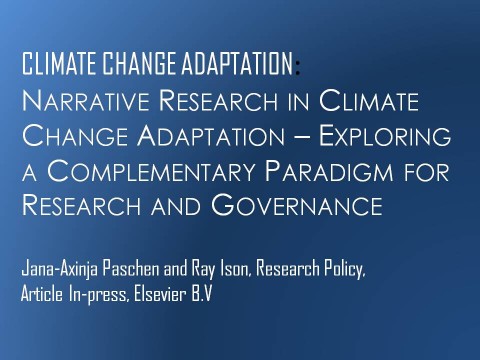Narrative Research in Climate Change Adaptation – Exploring a Complementary Paradigm for Research and Governance

OML Center Welcomes PARR Fellows from Malaysia
December 9, 2016
OML Center participates in learning session on El Niño
December 9, 2016Narrative Research in Climate Change Adaptation – Exploring a Complementary Paradigm for Research and Governance

Abstract:
Climate adaptation research increasingly focuses on the socio-cultural dimensions of change. In this context, narrative research is often seen as a qualitative social science method used to frame adaptation communication. However, this perspective neglects an important insight provided by narrative theory as applied in the cognitive sciences and other practical fields: human cognition is organized around specific narrative structures. In adaptation, this means that how we ‘story’ the environment determines how we understand and practice adaptation, how risks are defined, who is authorized as actors in the change debate, and the range of policy options considered. Furthermore, relating an experience through story-telling is already doing ‘knowledge work’, or learning. In taking narrative beyond its use as an extractive social research methodology, we argue that narrative research offers an innovative, holistic approach to a better understanding of socio-ecological systems and the improved, participatory design of local adaptation policies. Beyond producing data on local knowledge(s) and socio-cultural and affective-emotive factors influencing adaptive capacity, it can significantly inform public engagement, deliberation and learning strategies–features of systemic adaptive governance. We critically discuss narrative as both a self-reflective methodology and as a paradigmatic shift in future adaptation research and practice. We explore the narrative approach as a basis for participatory learning in the governance of socio-ecological systems. Finally, we assemble arguments for investing in alternative governance approaches consistent with a shift to a ‘narrative paradigm’.
You may download the full article here.
